Whether you’re an experienced project manager or you’ve just been assigned that role, there’s hardly a better way to enrich your knowledge than by absorbing information from one of the best sources of knowledge — directly from books.
What’s more, reading is provenly a good habit to possess, as it directly builds up your communication skills — one of the vital project management skills.
With this in mind, we present you with the 20 top project management books that simply must find a place on your office bookshelf (or in your e-reader).
We’ve made sure this list includes the best books to read in 2023 when you:
- Want to upgrade your managerial skills,
- Face a challenge on your project,
- Are in the mood for a business self-improvement book,
- Need a book to earn Professional Development Units (PDUs)
- Need to prepare for a Project Management Professional (PMP) exam, or
- Embark on a career in project management.
So, make sure to read through to the end, as we’ve prepared a quick overview of the most important things you’ll learn from each book.
What’s more, we’ve included the best quote, number of pages, and ratings for each individual title.

5 books every project manager should read
“Read the best books first, or you may not have a chance to read them at all”, said a famous American philosopher, Henry David Thoreau.
Well, we’ve got some good news — we’ve highlighted the best books every project manager should read.
Here are the 5 you should start with.
A Guide to the Project Management Body of Knowledge (PMBOK® Guide) – Seventh Edition
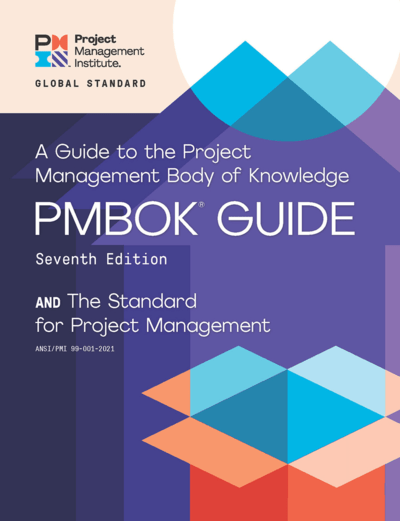
Goodreads: ★★★★☆ 3.69 (4,956 ratings) | Amazon: ★★★★★ 4.6 (3,039 ratings)
Author: Project Management Institute
Published: 2021
Number of pages: 250, paperback
Best quote: “Leadership is not exclusive to any specific role. High-performing projects may feature multiple people exhibiting effective leadership skills, for example, the project manager, sponsors, stakeholders, senior management, or even project team members. Anyone working on a project can demonstrate effective leadership traits, styles, and skills to help the project team perform and deliver the required results.”
PMBOK® Guides are authoritative, well-researched, and thorough resources for PM practitioners. This shorter and more reader-friendly 7th edition deals with the most relevant PM terms and concepts in detail.
New to this edition of the PMBOK® Guide are highly informative sections about Agile and hybrid methodologies.
Apart from this, the newest edition includes the concept of tailoring and explains that sticking to a single project management methodology might not bring a project to success. Therefore, it encourages project tailoring i.e. use of different approaches with the aim of meeting all project requirements.
While the Guide enumerates the 12 principles of PM such as stakeholders, value, and system thinking, it is structured around 8 project performance domains:
- Stakeholder,
- Team,
- Development Approach & Life Cycle,
- Planning,
- Project Work,
- Delivery,
- Measurement, and
- Uncertainty.
The domains represent activities essential for delivering value to the project and for successful project outcomes.
Additionally, there is a new section on models, methods, and artifacts used in project management, to support the sections on tools, techniques, and outputs supporting project management found in the previous editions.
Readers will be delighted to make use of PMIstandards+™ interactive digital platform with a plethora of useful practices and information on ongoing changes in the field.
What you’ll learn from a Guide to the Project Management Body of Knowledge – PMBOK® Guide?
In this book, you’ll read about:
- Different development approaches such as traditional, predictive, adaptive, etc.,
- Tailoring development approaches and processes to your needs,
- Project value delivery,
- Project governance and project environment, and
- Project management principles.
Read this book if you: want to dive into the world of project management or use it as a textbook to prepare for your PMP certification. The PMBOK® Guide is considered to be a must-read for project managers, and it definitely belongs in your library.
Making Things Happen: Mastering Project Management
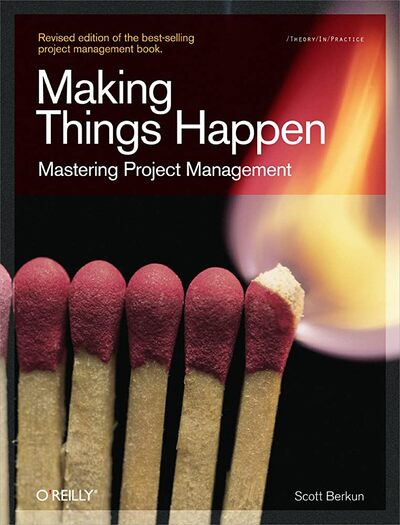
Goodreads: ★★★★☆ 3.96 (5,240 ratings) | Amazon: ★★★★★ 4.4 (284 ratings)
Author: Scott Berkun
Published: 2008
Number of pages: 408, paperback
Best quote: “Without change and the occasional struggle, we can’t learn or grow.”
The book is full of stories and examples based on the real-life experiences of the author, who was a project manager at Microsoft.
Personal essays in which the writer illustrates his own growth and the lessons he learned along the way teach us how to handle tricky situations and find workarounds.
Don’t expect to find definitions or some specific methods because this is not a formal guidebook. It offers hand-drawn diagrams and is focused on the writer’s strategies for leading a successful project.
What you’ll learn from Making Things Happen?
You’ll find useful advice on:
- Decision-making,
- Leading teams,
- Negotiating,
- Productivity,
- Scheduling,
- Dealing with tricky situations, and
- Monitoring.
Read this book if you: work in design, product management, or software engineering. This book is intended for project managers of all levels of experience since it provides practical advice and strategies for managing projects.
The Fast Forward MBA in Project Management
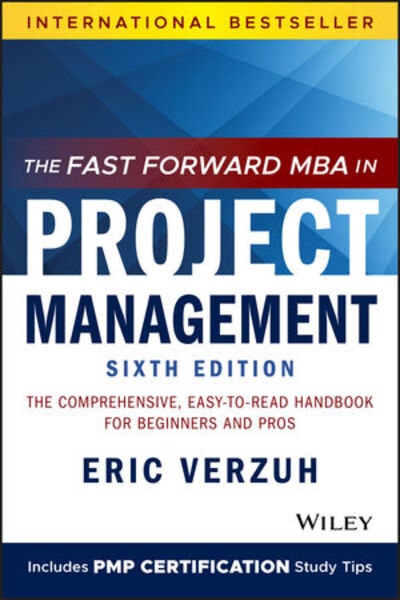
Goodreads: 3.74 ★★★★☆ (759 ratings) | Amazon: ★★★★★ 4.5 (214 ratings)
Author: Eric Verzuh
Published: 2021 (6th ed.)
Number of pages: 544 pages, paperback
Best quote: “There is no question that the best project managers are also outstanding leaders. They have vision, they motivate, they bring people together, and, most of all, they accomplish great things.”
This book is often found on the reading lists of many university courses and training programs.
Despite the fact that the vocabulary is technical and PM-specific, you won’t find it dry or boring, but rather easy to digest and follow.
The 6th edition includes several new chapters such as the ones on project quality, managing projects in the creative industry, and practices in Chain management.
The author also added study tips for PMP certification and access to downloadable forms and resources on his website.
The book is loaded with real-life examples, checklists, case studies, and templates that will help you broaden your knowledge.
What you’ll learn from The Fast Forward MBA in Project Management?
Not only will the book give you great insight into the PM field and cover major changes, but it will also help you prepare for a PMP certification test. It includes a chapter on Agile project management, as well as advice on how to:
- Define project objectives,
- Set realistic schedules and deliver projects on time,
- Form teams and track projects,
- Build budget estimates for your project, and
- Manage project stakeholders.
Read this book if you: are a program/project manager or a Product Owner. The book is written for all of you who need a comprehensive PM guide combined with practical advice.
Harvard Business Review Project Management Handbook
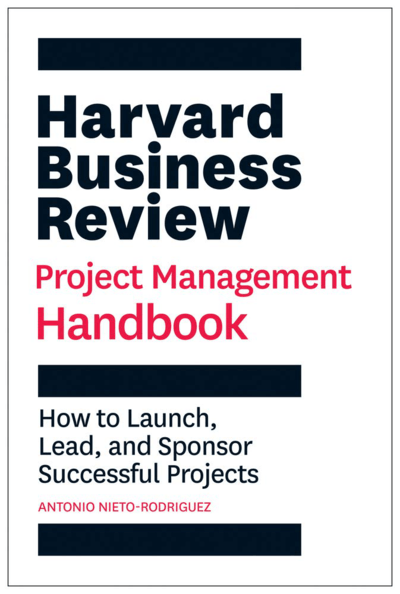
Goodreads: 3.79 ★★★★☆ (14 ratings) | Amazon: 4.6 ★★★★★ (270 ratings)
Author: Antonio Nieto-Rodriguez
Published: 2021
Number of pages: 352, paperback
Best quote: “Operations run the organization, but projects change the organization.”
HBR Project Management Handbook is the winner of the 2022 PMI David I. Cleland Project Management Literature Award.
The book comes from the pen of a PM expert who starts the piece by explaining the term project economy and why we need projects.
The author also introduces Project Canvas — a universal framework that encourages the concept of breaking down projects into building blocks that are easy to understand for everyone.
It provides key questions that help managers lay the project foundations. Some of the questions are:
- Why do we start the project?
- Who will manage the project?
- What are the project deliverables?
- What is the project cost?
Original case studies from both private and public sectors, graphics distilling tricky project elements, and an engaging writing style provide a roadmap for leading successful projects.
What you’ll learn from Harvard Business Review Project Management Handbook?
This handbook provides valuable information on:
- What the basics of project management are,
- When to go for a particular PM methodology,
- How to choose the right techniques to manage a project, and
- How to face challenges introduced by demanding global trends and still bring projects to success.
Read this book if you: have some experience in project management and want to learn from the best in the field.
The Deadline: A Novel about Project Management
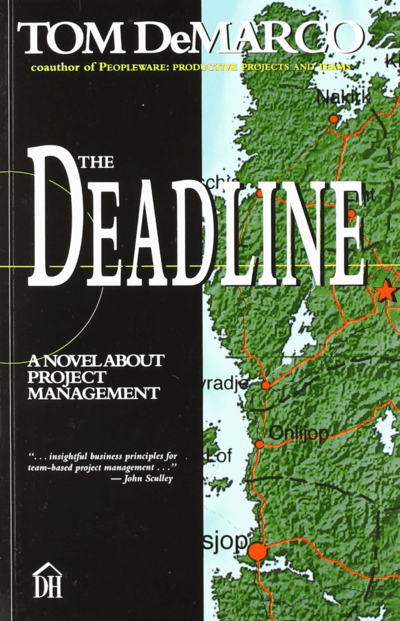
Goodreads: 4.17 ★★★★☆ (2,330 ratings) | Amazon: 4.4 ★★★★★ (275 ratings)
Author: Tom DeMarco
Published: 1997
Number of pages: 310, paperback
Best quote: “A day lost at the beginning of a project hurts just as much as a day lost at the end.”
Although written long ago when Waterfall PM methodology was the norm, concepts mentioned in this novel, such as managing people, motivation, and productivity, still apply to modern projects.
In this humorous and entertaining novel, the story follows a fictional software project manager, Mr. Webster Tompkins, who’s faced with a project of his lifetime. While trying to meet an impossible deadline, Tompkins faces a bunch of project management challenges, and this way, he walks us through the essential elements of his profession.
What you’ll learn from The Deadline?
After each chapter, you’re presented with Tompkins’s “journal”, which is a bulleted list of the most important lessons learned he has gathered from his day-to-day PM work. These lessons actually represent general project management guidelines — here are a couple of valuable quotes from his “journal”:
- “Change is essential to all success in project work (and in most other worthwhile endeavors).”
- “Manage projects by managing their risks.”
- “Avoiding risk is fatal, since it causes you to miss out on the associated benefit as well.”
- “Establish easy (perhaps anonymous) channels for bad news to be communicated up the hierarchy.”
- “People under pressure don’t think any faster.”
Read this book if you: are an experienced project manager seeking something non-technical but still PM-related to read or if you are brand new to the PM profession.
💡 Plaky Pro Tip
If you like reading project management quotes, check out the following article:
Books for beginners in project management
Project managers newly assigned to this position already face too many challenges.
Fortunately, there are ways to ease the entire process, and you can start by making your own project management checklist that will help you stay organized all the way through.
Another way is to add a couple of our book recommendations to your reading list — we believe they’ll make the start of your project management journey a lot easier.
Project Management for the Unofficial Project Manager
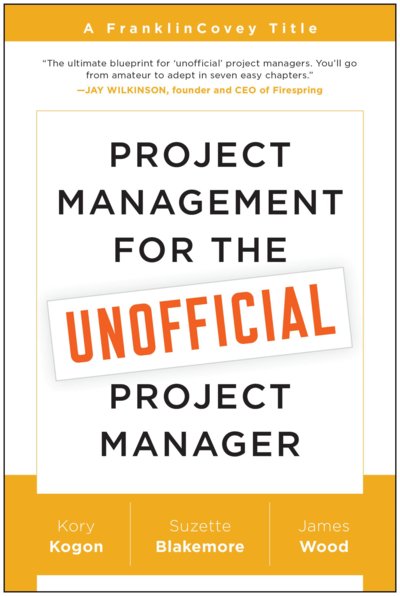
Goodreads: ★★★★☆ 4.08 (1,499 ratings) | Amazon: ★★★★★ 4.6 (1,817 ratings)
Authors: Kory Kogon, James Wood, Suzette Blakemore
Published: 2015
Number of pages: 256, paperback
Best quote: “Anything that can be changed will be changed until there is no time left to change anything.”
We can bet there are many of you out there who manage projects without being formally trained for that role. Since you are an “unofficial” project manager, this book is the right choice for you.
Through real-life examples and case studies, writers introduce you to the basic principles of project management and the ways you can apply them.
In addition, the book guides you through project management phases and emphasizes the importance of good leadership, i.e. provides the necessary techniques for establishing authority despite the lack of theoretical training.
What you’ll learn from Project Management for the Unofficial Project Manager?
Focusing on the practical examples immediately applicable to your day-to-day management, the book will teach you about the importance of transparent communication within the project team and provide instructions on how to motivate the people you manage.
Unofficial PMs and others reading this book will benefit from:
- Quick reviews found at the end of each chapter,
- References to PMBOK® Guide, and
- A section named Project Management Proverbs.
Read this book if you: are a newbie in PM or if you want to refresh your knowledge without having to deal with technical terms.
Project Management Absolute Beginner’s Guide
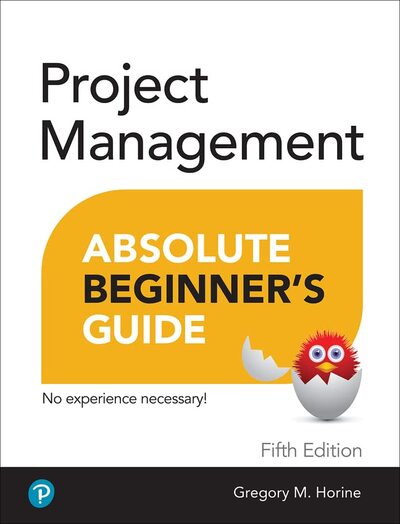
Goodreads: 3.65 ★★★★☆ (102 ratings) | Amazon: 4.7 ★★★★★ (16 ratings)
Author: Greg Horine
Published: 2022 (5th ed.)
Number of pages: 464, paperback
Best quote: “A project is the work performed by an organization one time to produce a unique outcome. By one time, we mean the work has a definite beginning and a definite end, and by unique, we mean the work result is different in one or more ways from anything the organization has produced before.”
Project Management Absolute Beginner’s Guide will equip you with project management basics and teach you the tools of the trade.
The guide covers Agile approaches, and it is synced to the latest features of Microsoft Project and PMI standards.
What you’ll learn from Project Management Absolute Beginner’s Guide?
The book includes many practical instructions and shows how to:
- Avoid common mistakes,
- Create a project management plan,
- Plan budget and schedules,
- Lead virtual, cross-cultural, and cross-functional teams,
- Manage project risks,
- Apply various PM methodologies,
- Deal with changes and various other issues, etc.
Read this book if you: are a beginner and you want to learn from a beginner-friendly guide.
Fundamentals of Project Management
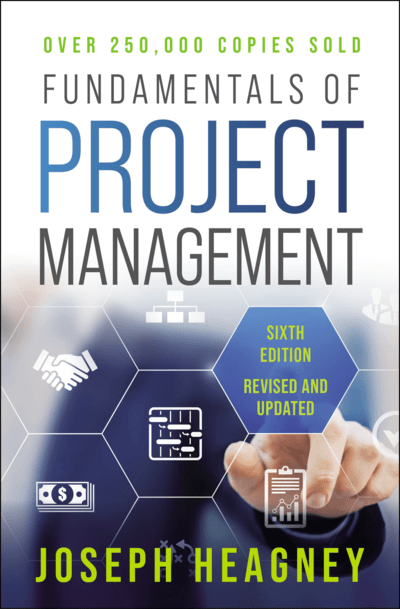
Goodreads: 4.00 ★★★★☆ (9 ratings) | Amazon: 4.8 ★★★★★ (10 ratings)
Author: Joseph Heagney
Published: 2022 (6th ed.)
Number of pages: 272, Paperback
Best quote: “The first rule of project management is that the people who must do the work should help plan it.”
This book has been a trusted source for years, and now, in its 6th edition, it brings updated tools, techniques, and exercises to boost your PM knowledge.
The book covers the changes made in the PMBOK® Guide, 7th edition and includes a range of exercises, visuals, and illustrations that will help you carry out your projects from planning to completion.
Also, the guide provides updated data and processes that will help you overcome any project mishaps.
The new edition includes some new sections such as:
- The “Project Recovery” chapter that elaborates on the expectations in the PM field in the 2020s,
- The “Pulse of the Profession Report 2021” introduced by the Project Management Institute, and
- An improved and revised “Working with Virtual Teams” section with advice on how to lead your teams in a virtual environment.
What you’ll learn from Fundamentals of Project Management?
Apart from grasping the theory, you’ll also acquire the know-how regarding:
- Post-pandemic project trends,
- Team communication,
- Project estimation,
- Scheduling,
- Technologies to support virtual team management,
- Leadership,
- Project planning, etc.
Read this book if you: manage a project, regardless of the project’s nature. It’s also great for students taking introductory courses on PM.
The Lazy Project Manager: How to be Twice as Productive and Still Leave the Office Early
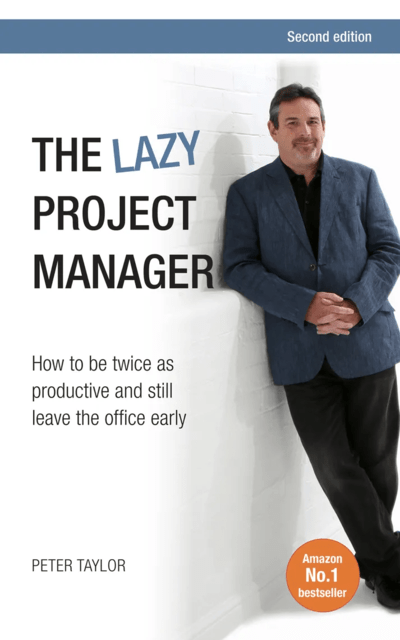
Goodreads: 3.49 ★★★★☆ (1,087 ratings) | Amazon: 4.2 ★★★★☆ (183 ratings)
Author: Peter Taylor
Published: 2015 (2nd ed.)
Number of pages: 152, paperback
Best quote: “Smart lazy people have a real edge over others in society and are most suited to leadership roles in organizations.”
The author uses the concept of “productive laziness” — based on the idea that only 20% of things people do during the day actually matter — as a starting point for this book. It goes on to explain how to actually be a productive project manager.
In a funny and engaging way, the author introduces the dinosaur theory, includes jokes about frogs and balloons, and mentions Monty Python. Through military and business-related principles, he supports delegating tasks and emphasizes the importance of trust in a project team.
What you’ll learn from The Lazy Project Manager?
Through entertaining anecdotes and stories, you’ll learn how to:
- Manage projects effectively,
- Access “productive-lazy heaven”,
- Deal with crises,
- Avoid burnout, and
- Get things done efficiently.
Read this book if you: are interested in picking up some useful tips and tricks about how to be more productive.
Books for earning PMI PDUs
Did you know that one of the ways to maintain your PM Certification is by reading books and collecting PDUs (Professional Development Units)?
Yes, it’s true.
To cut a long story short, here is how it all functions:
- Pick any PM topic-related book,
- Read and takes notes on what you’ve learned,
- Claim 1 PDU for each hour spent reading.
Now that you understand the process — it’s time for action.
Here’s our recommendation for interesting books for PMI PDUs, each followed by a brief overview.
The 7 Habits of Highly Effective People: Revised and Updated: Powerful Lessons In Personal Change – 30th Anniversary Edition
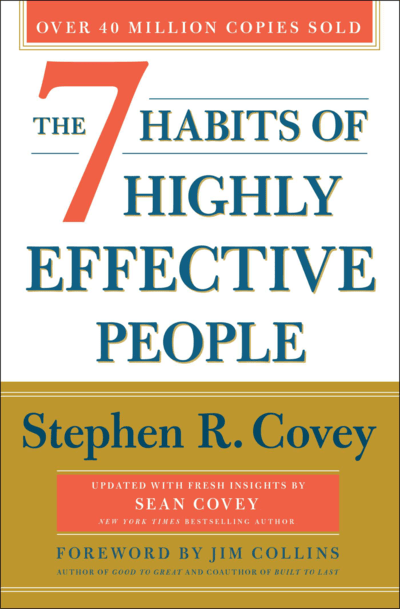
Goodreads: 4.15 ★★★★☆ (698,115 ratings) | Amazon: 4.8 ★★★★★ (11,752 ratings)
Author: Stephen R. Covey
Published: 2020
Number of pages: 496, paperback
Best quote: “Treat a man as he is and he will remain as he is. Treat a man as he can and should be and he will become as he can and should be.”
This remarkable book is easily one of the most-read books of the 20th century. The beloved classic offers inspiring real-life stories that will help you solve personal and professional issues as well as improve your interpersonal skills.
The goal of the book is to teach you how to become a better person and improve your social and emotional intelligence.
What you’ll learn from The 7 Habits of Highly Effective People?
The author explains in detail how creating certain habits will help build your character despite the rapid changes in the modern world. We’ve highlighted some of the useful habits you’ll learn about in this book:
- Being proactive,
- Identifying goals and values,
- Focusing on the important things,
- Demonstrating empathy.
Read this book if you: want to become an effective and productive person and leader.
The Goal: A Process of Ongoing Improvement – 30th Anniversary Edition
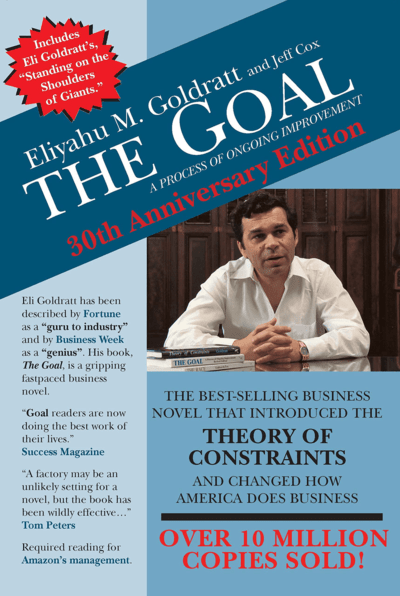
Goodreads: 4.08 ★★★★☆ (70,836 ratings) | Amazon: 4.6 ★★★★★ (7,107 ratings)
Author: Eliyahu M. Goldratt
Published: 2014
Number of pages: 366, paperback
Best quote: “Since the strength of the chain is determined by the weakest link, then the first step to improve an organization must be to identify the weakest link.”
The novel’s main character, Alex Rogo, faces many struggles while managing a failing manufacturing plant. Alex crosses paths with his former professor Jonah, who helps him overcome obstacles and identify bottlenecks in the plant organization.
The storyline teaches you how to constantly keep improving in the context of business operations and management.
What you’ll learn from The Goal: A Process of Ongoing Improvement?
From this book written in the form of a fiction novel, you’ll get insights into business fundamentals and learn valuable lessons about:
- The Theory of Constraints developed by the author himself,
- The importance of setting the right goals,
- Insights into the underlying principles of Lean project management.
- Finding work-life balance.
Read this book if you: are interested in business and project management in general.
The Power of Habit: Why We Do What We Do in Life and Business
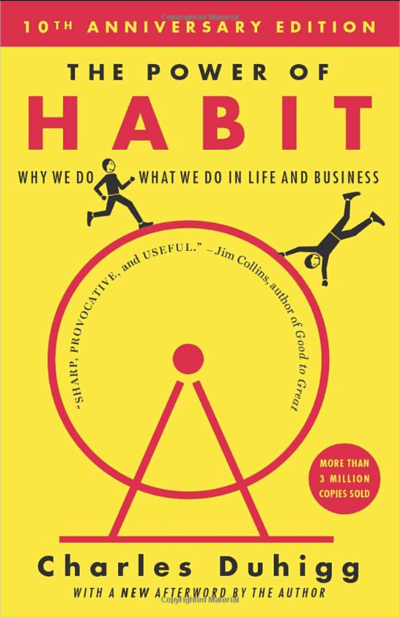
Goodreads: 4.13 ★★★★☆ (474,475 ratings) | Amazon: 4.6 ★★★★★ (36,868 ratings)
Author: Charles Duhigg
Published: 2014
Number of pages: 298, paperback
Best quote: “Change might not be fast and it isn’t always easy. But with time and effort, almost any habit can be reshaped.”
If there is science behind habits, is there also science behind changing habits?
Through authentic and vivid examples, this book explains how bad habits are formed. The author uses science to explain how habits work in insightful ways.
Even though bad habits cannot be removed, there are certain ways we can trick our brains into changing them into good habits.
The book covers 3 types of habits or, rather, 3 levels of habits we adopt.
Namely, the first part of the book deals with individual habits, and this is where you can read about the ”Habit Loop” and what helped Michael Phelps succeed in becoming the most successful Olympic swimmer of all time.
In the second part, we find out more about the habits of world-famous organizations such as Starbucks and Target superstores. You’ll be surprised to see how they know exactly what their customers need.
And finally, Duhigg introduces societal habits using the civil rights movement and the example of Rosa Parks.
The book is full of case studies and thought-provoking questions, and there is also a guide for the readers that covers guidelines for changing your habits.
What you’ll learn from The Power of Habit: Why We Do What We Do in Life and Business?
You’ll learn about both personal and business habits, as well as other interesting notions such as:
- How do people’s buying habits change after major life events?
- Why is belief crucial in changing habits?
- Are we responsible for our habits?
- Do we understand our habits?
Read this book if you: are ready to change your bad habits and are serious about it.
Leaders Eat Last: Why Some Teams Pull Together and Others Don’t
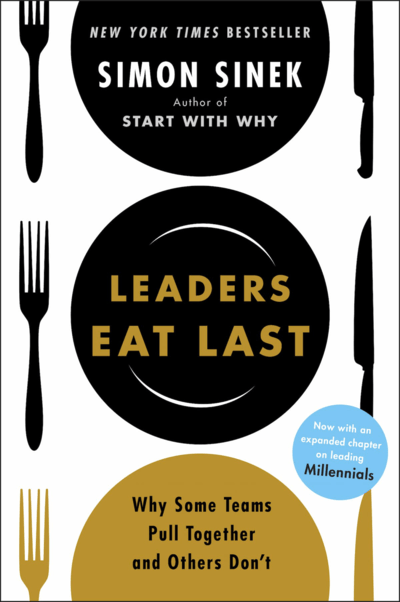
Goodreads: 4.11 ★★★★☆ (47,109 ratings) | Amazon: 4.7 ★★★★★ (14,877 ratings)
Author: Simon Sinek
Published: 2017
Number of pages: 350, paperback
Best quote: “If your actions inspire others to dream more, learn more, do more and become more, you are a leader. ”
Do you feel like you belong in your team? Are you fulfilled at work? If your answer is yes, you are a lucky winner. If your answer is no, send this book to your team leader.
This great book provides advice on how to make great teams, create a positive working environment, and foster trust among team members.
The author talks about the importance of our biological features, i.e. the hormones in charge of evoking positive feelings. When we feel appreciated and accepted, these hormones start up our enthusiasm for work and help reduce stress levels.
A range of examples from different industries such as the military and manufacturing keep you immersed in the book.
Also, this edition includes a section on Millenials and how different they are as employees compared to older generations. The author gives practical solutions to both companies and Millenias to understand each other and grow together.
What you’ll learn from Leaders Eat Last: Why Some Teams Pull Together and Others Don’t?
Leaders Eat Last is an engaging piece that provides precious knowledge on:
- The Circle of Safety,
- Effective leadership,
- Ways to reduce stress in your team, and
- Empathy among team members.
Read this book if you: are interested in improving your leadership skills.
Books for PMP exam preparation
There’s a time in almost every project manager’s life when they decide to make their knowledge officially recognized and apply for a project management certification.
We know how stressful this time might be — that’s why we’ve highlighted some books to help you prepare for a Project Management Professional (PMP) exam and possibly score higher.
Check out these exam prep books, and — fingers crossed — you’ve got this!
PMP Exam Prep: What You Really Need to Know to Pass the Exam
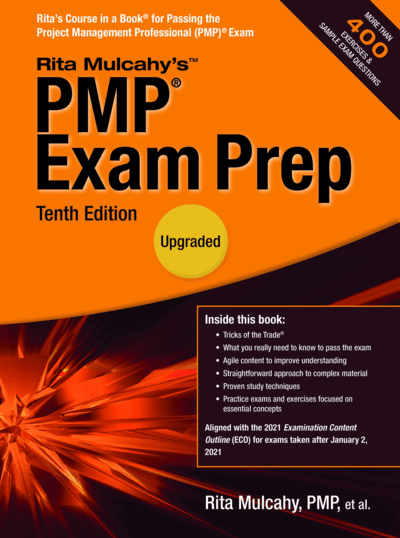
Goodreads: 4.00 ★★★★☆ (7 ratings) | Amazon: 4.6 ★★★★★ (269 ratings)
Author: Rita Mulcahy
Published: 2022 (10th ed.)
Number of pages: 537, paperback
Best quote: “Project management is both a science and an art.”
The PMP Exam Prep book Is an advanced preparation resource for the PMP exam. It serves as a comprehensive study plan and teaches you what’s necessary to pass the exam.
It complies with all the PMI requirements for the PMP exam and offers an abundance of exam sample questions and exercises.
In this upgraded edition, readers get a license to the basic subscription for PM Fast Track®, that is PMP® Exam Simulator where you can find 1 full 180-question simulation along with 8 focused tests.
It is also possible to pay for the full version of the simulator, which will get you unlimited testing options.
This is a trusty source that draws exam questions from its own database with more than 2,200 questions.
What you’ll learn from PMP Exam Prep: What You Really Need To Know to Pass the Exam?
This book will help you fill the gaps in your knowledge and guide you through the examination process, so you’ll learn:
- Proven techniques for passing the exam,
- Exam-related tips and tricks, and
- The exam’s trickiest areas.
Read this book if you: study for the PMP exam or you want to refresh your knowledge.
The PMP Exam: How to Pass on Your First Try
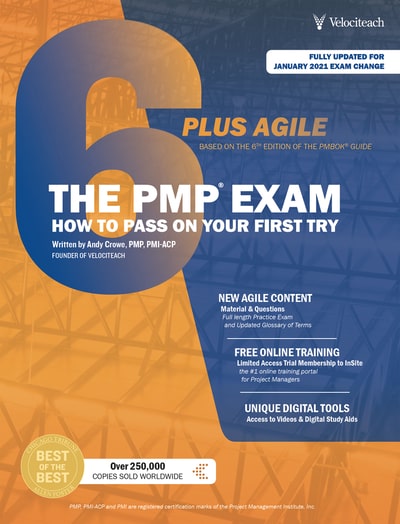
Goodreads: 4.28 ★★★★☆ (18 ratings) | Amazon: 4.6 ★★★★★ (282 ratings)
Author: Andy Crowe
Published: 2020
Number of pages: 840, paperback
Best quote: “Your goal in taking the PMP should be to do your absolute best and to make sure that your best effort falls within PMI’s passing score limits.”
The PMP Exam guide can serve as a great additional resource for exam preparation. It explains all the most important concepts of PM in a simple, yet formal language.
Chapters are organized by knowledge areas such as:
- Stakeholder Management,
- Communications Management,
- Cost Management, etc.
The book offers links to 60+ video materials, 475 exam questions to go through, and final exam questions and answers. What’s more, you get trial access to Velociteach’s e-learning portal (Velociteach is a project management education and certification exam prep company).
What you’ll learn from The PMP Exam: How to Pass on Your First Try?
Seemingly a bit easier than the real exam questions, the practice questions in this guide will give you a decent overview of PMP exam topics. Among other things, the guide covers:
- Predictive, Agile, and hybrid approaches,
- Common processes, inputs, tools, and outputs, and
- An entire section on how to pass the PMP exam, with tips and tricks.
Read this book if you: need a practical textbook to prepare you for the PMP exam.
PMP Exam Prep Simplified
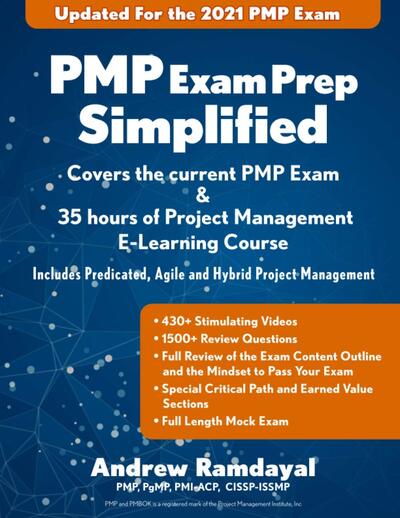
Goodreads: 4.43 ★★★★☆ (89 ratings) | Amazon: 4.6 ★★★★★ (1391 ratings)
Author: Andrew Ramdayal
Published: 2021
Number of pages: 478, paperback
Best quote: “A project by definition is temporary; it does not mean short or long. A project could be something as simple as painting a room, a task that will last for a few days, or something long-term, such as building a complex application, which could last two to four years. The key point is that all projects must be temporary, and they have a start date and an end date. The output of the project has to be unique and is unique to the customer.”
This guide offers a walkthrough of the application process for your PMP exam.
You should definitely take advantage of the e-learning course with 35 hours of project management material and more than 400 instructional videos.
Also, you can do the mock exam and check your knowledge right after you go through the 1,500 review questions provided in the book.
What you’ll learn from PMP Exam Prep Simplified?
The guide is fully updated and therefore provides valuable information on:
- Agile, hybrid, and traditional project management, and
- PMP exam secrets.
Read this book if you: need great practice material for passing your PMP exam
Agile PM books
Agile approaches and Agile methods serve as umbrella terms for different iterative PM methodologies, such as Scrum, Crystal, Scrumban, and so on. Agile has quickly become popular in many different fields other than IT thanks to the flexibility it enables in project management.
If you take a closer look at project management statistics, you’ll find that 30% of projects use Agile approaches.
However, experienced project managers should definitely read books written specifically on this topic — to ensure a clear understanding of the Agile approach.
Here are some ideas on what to read.
Agile Practice Guide
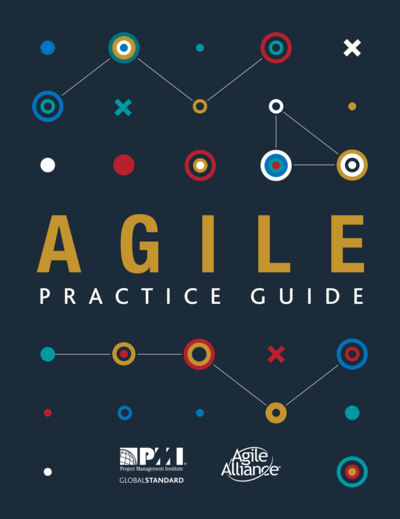
Goodreads: 3.70 ★★★★☆ (453 ratings) | Amazon: 4.6 ★★★★★ (1,723 ratings)
Author: Project Management Institute
Published: 2017
Number of pages: 210, paperback
Best quote: “The end goal is not to be agile for its own sake, but rather to deliver a continuous flow of value to customers and achieve better business outcomes.”
The Agile Practice Guide is project-focused and deals with a project life cycle and its implementation. The guide goes beyond the computer software industry to other, non-software development environments.
In this great piece, you’ll discover how to use Agile approaches as well as when and where to bring them into play.
This guide has been written thanks to the collaboration between Project Management Institute and the Agile Alliance.
What you’ll learn from Agile Practice Guide?
Among other things, this guide will teach you about:
- Implementing Agile approaches at a project or team level,
- Most popular Agile approaches,
- Factors to consider when choosing an approach, and
- Use of Agile beyond software development.
Read this book if you: want to get a better understanding of the Agile approach and practices or prepare for your PMP or CAPM. The book is a must for Product Owners, Scrum Masters, and all other people using Agile principles.
Doing Agile Right: Transformation Without Chaos
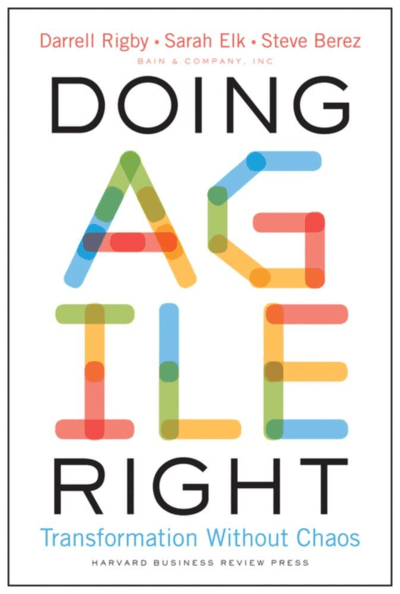
Goodreads: 3.84 ★★★★☆ (676 ratings) | Amazon: 4.5 ★★★★★ (675 ratings)
Authors: Darrell Rigby, Sarah Elk, Steve Berez
Published: 2020
Number of pages: 256, hardcover
Best quote: “A company embarking on an agile transformation has a built-in advantage over companies seeking other kinds of changes, because it has the tools of agile at its disposal.”
This amazing book instructs you on how to do Agile right.
However, the authors don’t fail to explain the possible misuses of Agile on examples of certain companies, hoping these stories will serve as a good lesson to learn from.
This book shows that balance is essential and Agile can’t be applied to every project, team, or company.
Doing Agile Right succeeds in distilling all the features of the Agile approach and leaves no doubts if you decide to go Agile.
What you’ll learn from Doing Agile Right?
Among many instructions you’ll get in the book, you’ll learn about:
- Elements comprising Agile,
- Scaling Agile,
- Leading Agile companies,
- Agile planning and budgeting, and
- Agile structures and people.
Read this book if you: want to build agile habits, recognize and avoid possible pitfalls, and improve the performance of your team.
Scrum PM books
A vital step towards becoming a Scrum Master entails some reading.
The following books will provide a strong foundation for the Scrum approach and help you understand its very essence.
Scrum: The Art of Doing Twice the Work in Half the Time
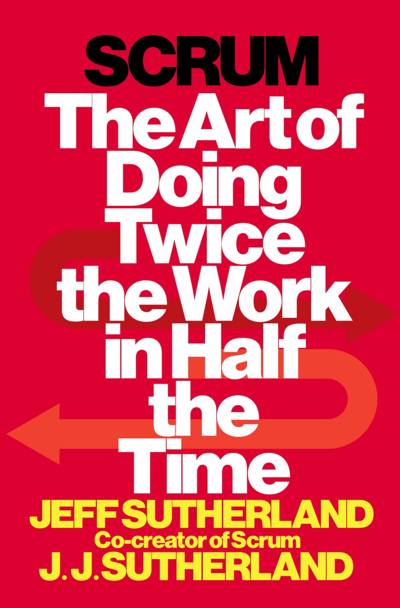
Goodreads: 4.16 ★★★★☆ (20,580 ratings) | Amazon: 4.6 ★★★★★ (5,038 ratings)
Author: Jeff Sutherland
Published: 2015
Number of pages: 248, paperback
Best quote: “Multitasking Makes You Stupid. Doing more than one thing at a time makes you slower and worse at both tasks. Don’t do it. If you think this doesn’t apply to you, you’re wrong — it does.”
In this book, the author explains the basic ideas and the philosophy behind Scrum, which serves not only to strengthen cooperation but to help a team work efficiently.
The book gives valuable information on how Scrum can be implemented. Sutherland uses examples from software companies, healthcare, the US military, etc. to illustrate the process.
What you’ll learn from Scrum – The Art of Doing Twice the Work in Half the Time?
After reading this book, you’ll gain basic knowledge about Scrum, as well as how to begin implementing Scrum in your team or organization. You’ll also read about:
- The origins of Scrum,
- Waste management,
- The importance of setting priorities, and
- Project time management.
Read this book if you: are a manager or CEO who wants to learn more about Scrum and how to implement it.
The Scrum Fieldbook: A Master Class on Accelerating Performance, Getting Results, and Defining the Future
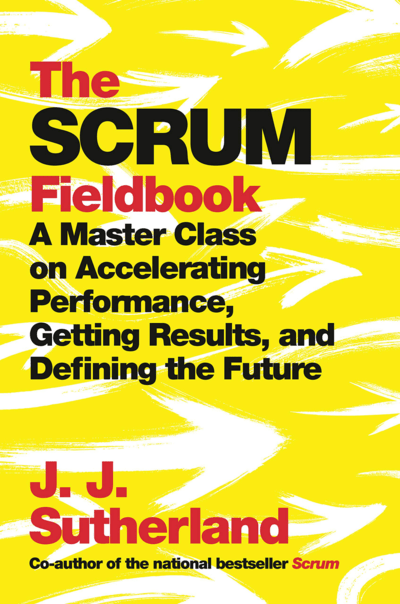
Goodreads: 4.02 ★★★★☆ (482 ratings) | Amazon: 4.6 ★★★★★ (316 ratings)
Author: J.J. Sutherland
Published: 2019
Number of pages: 272, hardcover
Best quote: “What Scrum does is give you quick feedback on whether that decision was a good one or not. It allows you to pivot, to change your mind, to seek a different path, to tack toward the goal. Each quick decision informs the next. The path emerges from the doing.”
Scrum is not only effective for teams in IT companies, but for any kind of team, in any industry. It’s exactly what this book provides — examples of companies using Scrum in all kinds of industries.
The book includes great case studies which show the importance and value of Scrum implementation.
What you’ll learn from The Scrum Fieldbook: A Masterclass on Accelerating Performance, Getting Results, and Defining the Future?
Based on years of work in the field, the author gives many real-life examples of how Scrum was implemented in non-technology companies, such as:
- Toyota — automotive industry,
- 3M — manufacturing and development industry,
- Schlumberger — oil and gas industry,
- Autodesk — software industry, etc.
Through practical examples, you’ll learn about:
- Positions in a Scrum team and their responsibilities,
- Elements of Scrum, and
- Scrum meetings and their purpose.
Read this book if you: are a business leader and/or manager striving to become a high performer and achieve visible results at work.
Expert book recommendations
So, we have created a list of our favorite project management books that are worth your time. But, we have also reached out to experts to check what they read, and here’s what they told us.
Our first expert is Alex Weekes — product manager and Agile certified project manager — who shared his 2 favorites — “Inspired” and “Sprint”.
Alex Weekes: Inspired by Marty Cagan
The first one on the list of Alex Weekes is “Inspired” by Marty Cagan, which he describes in the following way:

“A great book for thinking about managing projects that revolve around building tech products. More product management than just pure project management but great for connecting the process to the outcome.”
Alex Weekes: Sprint by Jake Knapp
The second favorite is “Sprint” by Jake Knap, and here’s what he has to say about it:

“Good for the actual day-to-day process of a discovery that starts a product-based project.”
Danny Nathan: The Phoenix Project by Gene Kim, Kevin Behr, and George Spafford
Our next expert is Danny Nathan — founder/CEO of the product design and venture studio Apollo 21. Here’s why he singled out The Phoenix Project:

“Unlike most business books that are focused on theory supported by case studies, The Phoenix Project is written like a novel making it a quick and easy read. There are specific sections of the book where the “teaching moments” come in, but they are generally from the perspective of a specific character and easy to pick up on.
He also mentioned the book’s impact on the processes within his team:

“I recently had my entire leadership team read the book prior to an off-site during which we endeavored to define, articulate, and document in detail all of the processes that we use at Apollo 21. The Phoenix Project gave us a common language and foundational understanding with which to approach the task.”
The experts we talked to added a few more books to our list. So, if you are not sure where to start your reading, we have advice on that as well.
Summary: How to pick the right PM books for you
Before we tell you how, let’s first start with s a brief overview of the books we’ve highlighted in this post, divided by categories:
| Must read PM books | PM for Beginners | Books for PMI PDUs | PMP exam prep books | Books on Agile | Books on Scrum |
|---|---|---|---|---|---|
| PMBOK® Guide | Project Management for the Unofficial Project Manager | The 7 Habits of Highly Effective People | Rita Mulcahy’s PMP Exam Prep | Agile Practice Guide | Scrum: The Art of Doing Twice the Work in Half the Time |
| Making Things Happen | Project Management Absolute Beginner’s Guide | The Goal: A Process of Ongoing Improvement | The PMP Exam: How to Pass on Your First Try | Doing Agile Right: Transformation Without Chaos | The Scrum Fieldbook |
| The Fast Forward MBA in Project Management | Fundamentals of Project Management | The Power of Habit | PMP Exam Prep Simplified | ||
| HBR Business Review Project Management Handbook | The Lazy Project Manager | Leaders Eat Last | |||
| The Deadline: A Novel about Project Management |
As we’ve already mentioned in the introduction — reading is a good habit that directly influences project managers’ soft skills development in a positive way.
Now that we’ve established why and what to read, here’s our advice for all the project manager geeks out there — steps to manage your reading the way you manage your projects — i.e. in project phases:
| Project phases | Reading phases |
|---|---|
| Initiation | Decide what to read; set a goal |
| Planning | Schedule time for reading |
| Execution | Read |
| Monitoring and control | Eliminate distractions |
| Closure | Enjoy the knowledge you’ve gained |
So, reading will almost certainly upgrade both your personal and professional skills — with all that in mind — it’s time to grab a book and initiate your reading project.
Conclusion: Develop your reading habits the way you develop your projects
Every human being is different, and we also differ in the amount of time we spend reading. Some of us can’t imagine a day without reading at least several pages, while others can’t find time for reading books for days or even months on end.
Nevertheless, we are all aware of the impact reading has on our lives. Reading has always been the way to learn something new, set foot in other worlds and historical periods, and upgrade our knowledge on millions of topics.
When it comes to professional development, every field has guides, textbooks, practice books, and other types of publications that help us improve our skills.
This article lists the 20 best project management books in 2023. Our list is based on our personal favorites, bestseller lists, and book ratings.
We hope you’ll include these titles in your personal reading list and extract the best advice you can find to support your projects and teams.
Also, we encourage you to give your reading habit development a chance — we promise it will have a great impact on your professional growth.
📖 Preparing for an upcoming PMP exam or simply looking to learn more about project management? Browse our Project Management Glossary of Terms and dive deeper into the world of basic and advanced project management terminology.
How we reviewed this post: Our writers & editors monitor the posts and update them when new information becomes available, to keep them fresh and relevant. Updated: June 16, 2023
Updated: June 16, 2023 
